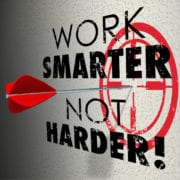Working hard vs. working smart
Have you heard this distinction before? All sorts of management experts talk about how people can work more efficiently, more effectively, maximizing the results of time. Some of them even have good ideas.
I’ve been thinking about what it means to say that practicing law is hard work. I don’t have any question that it is challenging and demanding, for reasons that I’ve mentioned numerous times. What I find myself wondering is whether it’s possible to “work smart” in practice; I think the answer is a qualified yes.
Working smart means managing your physical environment. If you take the time to keep your desk clear, so it’s always easy to locate the files and the resources you need. Nothing wastes time like clutter. The simple act of taking an extra 5-10 minutes to clear and tidy your work area at the end of the day can yield significant time savings. I had to learn this the hard way, but having learned it, it’s become a standard for myself in the office.
Working smart means managing energy. If I’m exhausted and I try to power through rather than resting, chances are good that it’ll take me more time than usual to accomplish anything. If I’m on a deadline, the adrenaline will carry and cancel the “dead woman drag” — but if it’s an average Wednesday, I didn’t sleep well, I have a headache, and I notice that I’m reading things three times and still not registering, taking a pause will be well worth my time. When I have plenty of energy and get in the flow of work, I often find that my productivity shoots up and I’m able to accomplish remarkable tasks, so I do my best to take advantage of my energy rhythms.
Working smart means managing commitments. It’s easy to say yes to every demand, but it isn’t smart. Making intentional and purposeful decisions about which commitments to accept and which to decline allows me to avoid the frazzled, frantic pace that undermines good work.
Working smart means managing people. Good delegation enhances effective work. Whether it’s requesting research from a more junior lawyer or asking an assistant to draft routine communications for my review and editing, my time is freed up so I can concentrate on doing the things that others can’t do.
Does any of this mean that it’s possible to take shortcuts and reap the rewards of practice without putting in plenty of time and effort? Absolutely not. But attention to smart management will make the time and effort you put into your practice pay maximum rewards.




Leave a Reply
Want to join the discussion?Feel free to contribute!